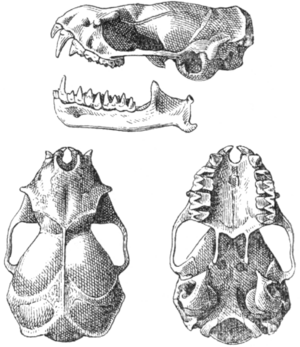Little goblin bat facts for kids
Quick facts for kids Little goblin bat |
|
|---|---|
 |
|
| Skull of holotype (♂). | |
| Conservation status | |
| Scientific classification |
|
| Kingdom: | Animalia |
| Phylum: | Chordata |
| Class: | Mammalia |
| Order: | Chiroptera |
| Family: | Molossidae |
| Genus: | Mormopterus |
| Subgenus: | Mormopterus |
| Species: |
M. minutus
|
| Binomial name | |
| Mormopterus minutus (Miller, 1899)
|
|
| Script error: The function "autoWithCaption" does not exist. | |
| Synonyms | |
|
|
Script error: No such module "Check for conflicting parameters".
The little goblin bat (Mormopterus minutus) is a small bat found only in Cuba. It belongs to the Molossidae family, known for their tails that stick out beyond their flight membranes.
These bats are currently considered vulnerable. This means their numbers are decreasing. They often make their homes in palm trees and buildings. Little goblin bats eat only insects. They find their food by using echolocation, which is like sending out sound waves and listening for the echoes.
Contents
What the Little Goblin Bat Looks Like
This bat is quite small. Its total body length is about 71 mm (2.8 in). Its fur is short and thick, with hairs around 3 mm (0.12 in) long.
The bat's face has very little fur. Its wing membranes have fur close to its body. The membrane between its legs and tail also has hair on both sides. Its forearm is about 30 mm (1.2 in) long. The ears are small and pointy. It has 28 teeth in total.
Where Little Goblin Bats Live
The little goblin bat is the only bat species that lives only in Cuba. This means it is endemic to Cuba. These bats have been found in places like Trinidad, Cuba, Omaja, and near Preston, Cuba.
Scientists believe that the ancestors of these bats might have come from Central America. They likely traveled to Cuba a long time ago, possibly over a land bridge that no longer exists.
How Scientists Named This Bat
The little goblin bat was first described by a scientist named Gerrit Smith Miller Jr. in 1899. He first put it in a different group of bats called Nyctinomus. The name minutus means "small" in Latin. Miller chose this name because it was the smallest bat of its kind known at the time.
Later, in 1907, Miller decided that this bat belonged in the Mormopterus group. Within the Mormopterus group, the little goblin bat is part of the kalinowskii group. This group includes bats that are closely related, such as:
- Kalinowski's mastiff bat (Mormopterus kalinowskii)
- Incan little mastiff bat (Mormopterus phrudus)
Little Goblin Bat Biology
These bats are insectivores, meaning they eat insects. They catch insects while flying. They use echolocation to find their prey. This species can even change its echolocation style depending on where it is flying. For example, it might change its calls if it's in an open field versus a dense forest.
Sometimes, a tiny parasite called Ochoterenatrema breckenridgei can be found in the bat's stomach. This parasite uses mosquitoes as a middle step in its life cycle. When bats eat infected mosquitoes, the parasites can grow inside the bat's intestines.
Protecting the Little Goblin Bat
As of 2017, the IUCN lists the little goblin bat as a vulnerable animal. This is because the areas where it lives are shrinking. Also, the quality of its habitat is getting worse.
The main danger to this bat is habitat destruction. This happens when places where bats live are damaged or disappear. This can be due to human activities like building or farming. Protecting their homes is very important to help these bats survive.
See also
 In Spanish: Murciélago de la Jata para niños
In Spanish: Murciélago de la Jata para niños
 | Selma Burke |
 | Pauline Powell Burns |
 | Frederick J. Brown |
 | Robert Blackburn |


